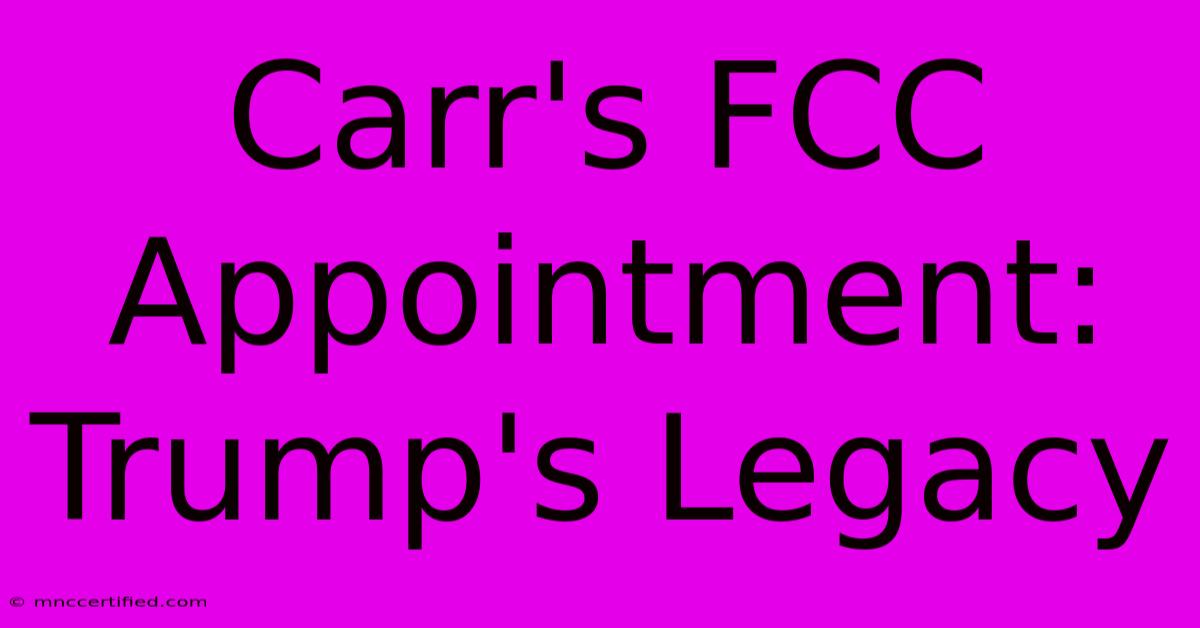Carr's FCC Appointment: Trump's Legacy

Table of Contents
Carr's FCC Appointment: Trump's Controversial Legacy
Ajit Pai's appointment as Chairman of the Federal Communications Commission (FCC) during the Trump administration remains a contentious topic, sparking heated debates about its long-term impact on media regulation and telecommunications policy. This article delves into the appointment's context, its consequences, and its lasting legacy within the broader narrative of the Trump presidency.
The Appointment: A Pivotal Moment
President Trump's nomination of Ajit Pai, a Republican lawyer with deep ties to the telecommunications industry, to lead the FCC was met with immediate backlash from various sectors. Pai's previous role as an attorney for Verizon and his outspoken views on deregulation raised concerns about potential conflicts of interest and a shift towards policies favoring corporate interests over public good. This appointment, occurring in 2017, marked a significant turning point in the FCC's trajectory.
Key Criticisms of the Appointment:
- Regulatory Rollbacks: Critics argued that Pai's appointment signaled a move away from net neutrality principles, potentially jeopardizing the open and fair internet access enjoyed by millions.
- Media Consolidation: Concerns arose about the potential for increased media consolidation under Pai's leadership, leading to less diversity of voices and potentially biased news coverage.
- Lack of Transparency: The appointment process itself faced criticism, with some arguing it lacked sufficient transparency and public engagement.
- Industry Ties: Pai's close relationship with the telecommunications industry fueled concerns about undue influence and prioritization of corporate interests over public welfare.
Pai's Actions as FCC Chairman: Key Policies and Decisions
Pai's tenure as FCC chairman witnessed several significant policy changes, many of which became highly controversial and continue to be debated today. These included:
- Repeal of Net Neutrality: This is arguably Pai's most defining action. The repeal of net neutrality rules, established during the Obama administration, removed regulations designed to prevent internet service providers (ISPs) from prioritizing certain traffic over others. The resulting debate was intense, with proponents arguing for free market principles and opponents citing potential for discriminatory practices and reduced internet access for certain populations.
- Relaxation of Media Ownership Rules: Pai's FCC also relaxed certain media ownership rules, allowing for greater consolidation within the broadcasting and media industries. This move sparked concerns about decreased competition and the potential for reduced diversity of viewpoints.
- Changes to Broadcast Regulations: Several changes to regulations affecting broadcasting, including those relating to local television ownership and the accessibility of broadcasting services, were also implemented during Pai's tenure.
The Lasting Legacy: A Divided Opinion
The legacy of Ajit Pai's appointment as FCC chairman under the Trump administration remains a contentious issue. While supporters point to deregulation as promoting competition and innovation, critics highlight the potential negative consequences for consumers, particularly regarding net neutrality and media diversity.
Long-Term Impacts:
- The Fight for Net Neutrality Continues: The repeal of net neutrality sparked ongoing legal battles and advocacy efforts to restore these protections.
- Increased Media Consolidation: The impact of relaxed media ownership rules continues to be debated, with concerns persisting over reduced competition and potential bias.
- A Shifting Regulatory Landscape: Pai's actions have significantly shifted the regulatory landscape, creating an environment where corporate interests may play a more significant role in shaping telecommunications and media policy.
Conclusion: A Complex and Contentious Issue
The appointment of Ajit Pai as FCC Chairman during the Trump administration remains a highly significant event, deeply impacting telecommunications and media policy. Its legacy is complex and continues to generate heated discussions about the balance between deregulation, corporate influence, and the public interest. The ongoing debate serves as a crucial reminder of the importance of civic engagement and the need for transparent and accountable governance in shaping essential public services like internet access and media broadcasting.

Thank you for visiting our website wich cover about Carr's FCC Appointment: Trump's Legacy. We hope the information provided has been useful to you. Feel free to contact us if you have any questions or need further assistance. See you next time and dont miss to bookmark.
Featured Posts
-
Astros Ballpark Now Daikin Park
Nov 19, 2024
-
Trump Dance In The Sports World
Nov 19, 2024
-
Coleen Rooney Wagatha Christie Saga Free
Nov 19, 2024
-
Swift Kelce Bills Fans Response
Nov 19, 2024
-
Paytons Impact Bo Nixs Broncos Rise
Nov 19, 2024